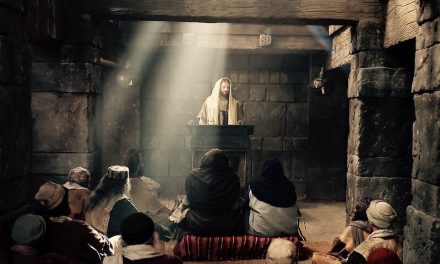Thanks to my friends at the Catholic Peace Fellowship, I spent my Advent being reminded of many of the great insights of Dorothy Day. (“Like” their Facebook page for a stream of great classic pieces.) In particular, I’ve been thinking of late about the importance Dorothy placed on using the “weapons of the Spirit.” This was a concept that she drew from (and encouraged in) Fr. John Hugo. The “weapons of the Spirit,” broadly speaking, are the traditional Lenten practices of prayer, fasting, and almsgiving. Day and Hugo developed these more specifically to include the Works of Mercy and voluntary poverty. Day also got very specific sometimes about the sorts of things one ought to fast from, emphasizing fasting from products that were produced in unjust conditions. Though Day was, of course, what we would call an “activist,” she was also deeply, deeply committed to spiritual practices with no measurable material result (things like Mass attendance, Adoration of the Blessed Sacrament, personal prayer).
For Day, we fight with spiritual weapons not because we believe that they are the most effective (though Day herself certainly believed that they were), but because we are called to follow Christ, who himself wielded non-violent weapons. Fr. Robert Barron describes this in his 2002 Christmas essay “Comes a Warrior”:
There is, of course, another reason for the simplicity and poverty of his arrival: he is to be a soldier, but he will not fight with the violent weapons of the Herods, Ceasars and other kings of this dysfunctional world. Rather he will wield the sword of non-violence and the spear of forgiveness; and he will wear the helmet of righteousness and the breastplate of compassion. He will conquer through the finally irresistible power of love, the same power with which he made the universe.
Love, forgiveness, righteousness, compassion and non-violence are Christ’s weapons and armor, and ours as well. And yet, these weapons, I find, are nearly impossible to wield well without prayer. Certainly, there are people in my life whom it is easy to love, easy to forgive, easy to show compassion toward. But there are also those who simply don’t deserve it! with whom these things are a much greater challenge, for whom and about whom I must pray very hard and beg God for the grace to see them as God’s children as well. There are areas in my life where righteousness comes relatively easily, and those areas in which I struggle. Prayer and penance are the essential spiritual weapons that help me to see my own limitations and also train me to surpass them, becoming more righteous, compassionate, forgiving, and loving. In a way, prayer and penance are private and spiritual; they have no measurable effect on the state of affairs in the world. And yet, I know that I am changed by them; I know that they impact my attitude, my actions, and (I hope) my relationships.
This is a personal spiritual and moral battle, but it is also one that we share as a Church. Part of what led me to reflect on the weapons of the Spirit is that the USCCB has asked US Catholics to pray and fast for life, marriage, and religious liberty. The bishops are asking for five things, actually, 3 of which depend on a parish community (monthly eucharistic adoration, Prayers of the Faithful for these intentions, and Fortnight for Freedom events). The two remaining requests are personal, not necessarily communal: a daily rosary and fasting and abstinence on all Fridays. This call goes from the Feast of the Holy Family (December 30, 2012) to the Feast of Christ the King (November 24, 2013).
Here on this blog, as everywhere in the Catholic blogosphere, we put forward our arguments about life issues, about marriage, and about religious freedom. These are, of course, the issues that divide not simply the nation but the Church as well. Even where we agree about basic issues of conscience, we are more often than not divided about how prudence should direct our concrete choices around policies. And we tend to focus on the arguments, actions, policies, and politics that will somehow make a difference. When I first saw the bishops’ call to prayer, the cynic in me thought (1) that nobody would really accept this call and (2) that it wouldn’t make a difference if they did. But, on consideration, I’ve realized three things. First, I do believe that prayer always makes a difference, whether that difference is visible and measurable or not. Of course, that leads to the second realization: that I have to at least aim to do the fasting, abstinence, and rosaries (let’s admit it here: the spirit may be willing, but the flesh is weak). And, of course, that led to a third insight, that I ought to invite others to accept the bishops’ call to prayer and penance as well.
So, please check out the bishops’ call to prayer and participate as you are able (one rosary a week? fasting on First Fridays, abstaining on the rest?). The promise of these practices is that, in doing them, they remake us into the image of Christ. Whether you think that the Bishops are exactly right in everything they do or couldn’t be more wrong, you are probably driven by a sense of who Christ is and how He would carry Himself in their place. Imagine the Church carrying itself in more Christ-like ways, with greater love, compassion, forgiveness, and righteousness as it engages others in the public square on these issues. Let us wield the weapons of the Spirit and in so doing become more and more who we are called to be as followers of Christ. Perhaps we will reshape the church and the nation while we’re at it. Perhaps not. If we are still skeptics about the power of prayer, perhaps we should make our own a prayer that Dorothy Day borrowed from Mark’s gospel: “Lord, I believe. Help Thou my unbelief.”





Trackbacks/Pingbacks